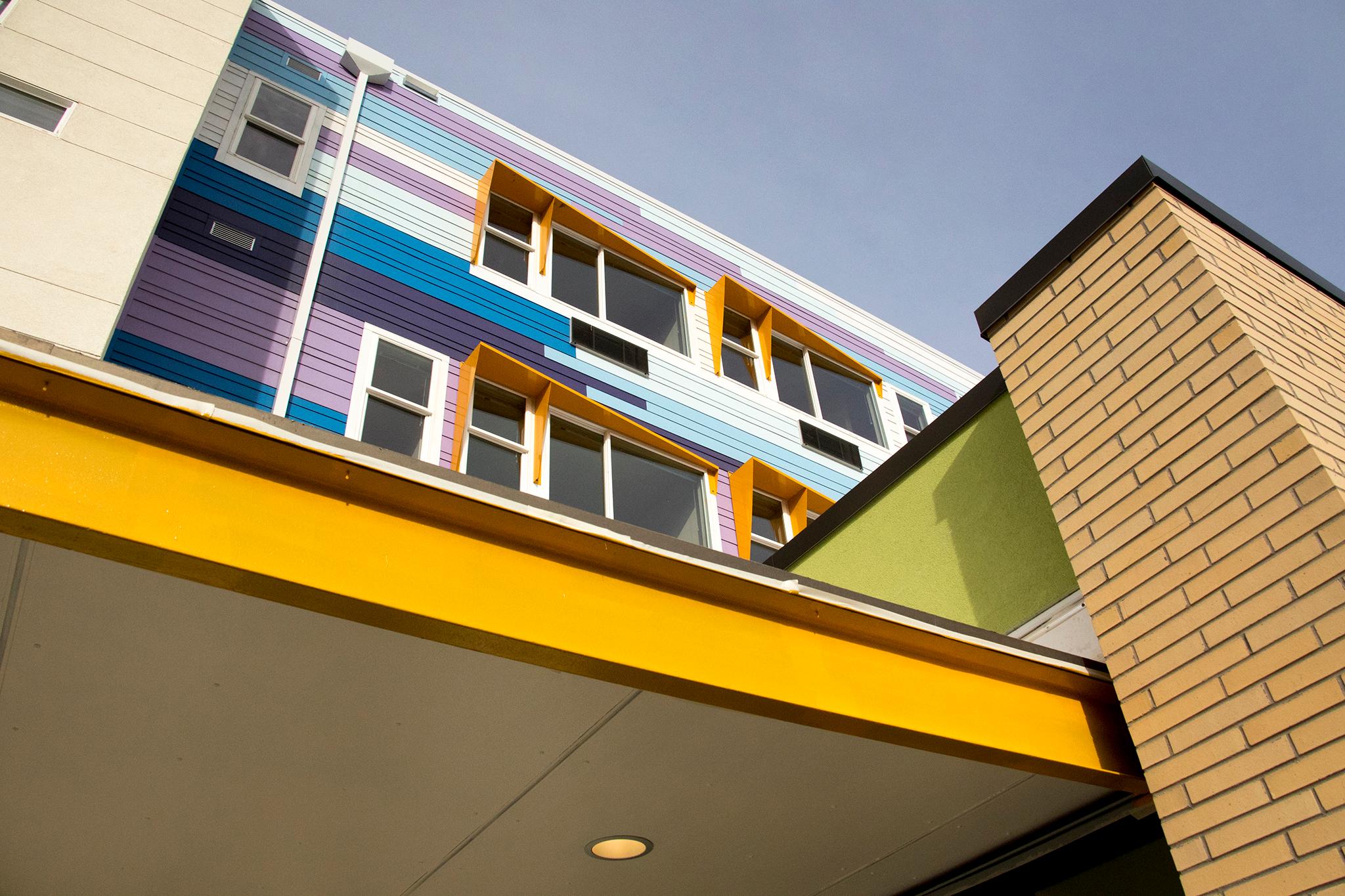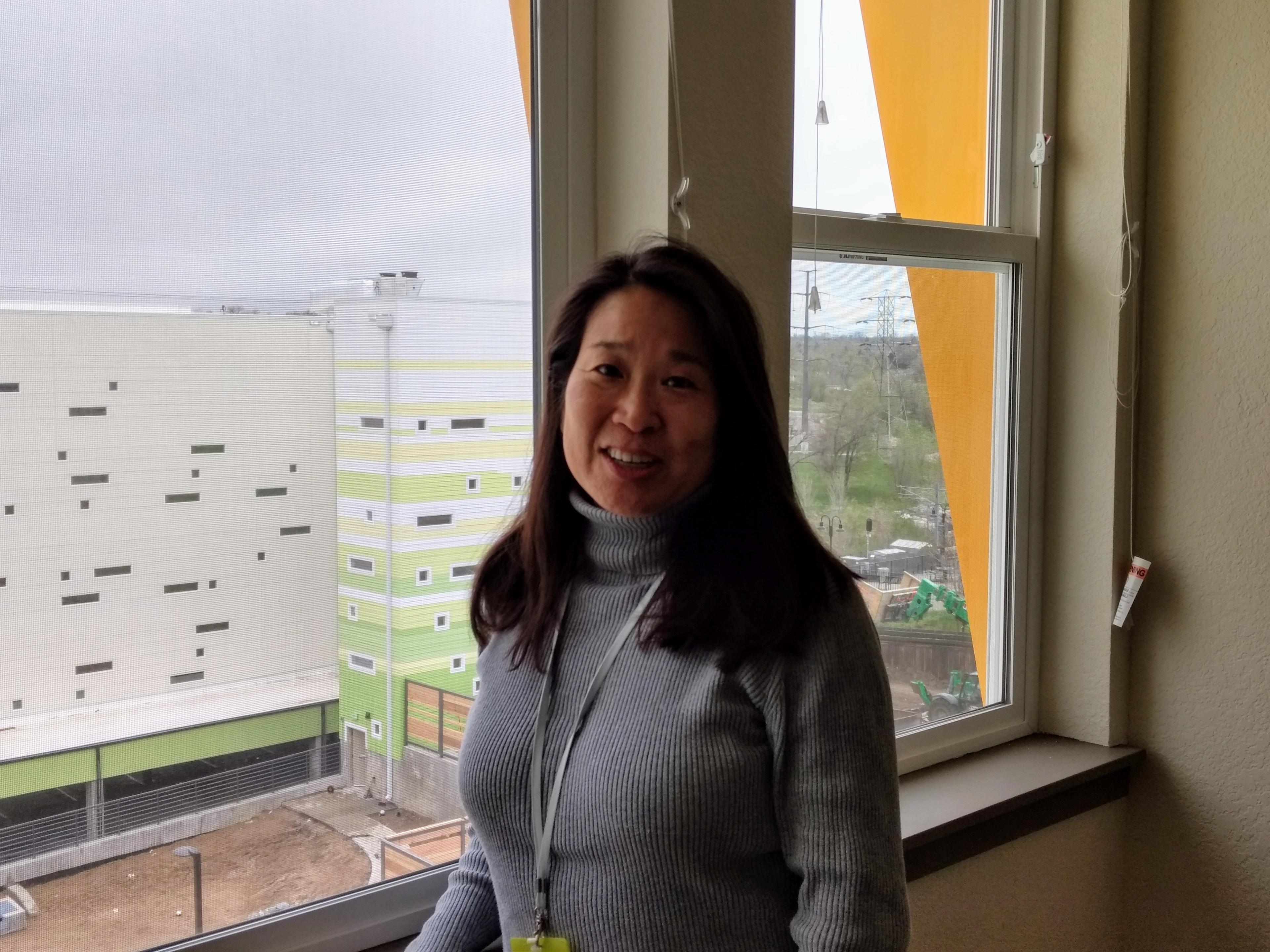The Delores Project has a new leader as the nonprofit takes on permanent housing after two decades of providing temporary shelter to women and transgender people. Her arrival also comes as a proposal to allow camping in Denver's public spaces has put the spotlight on homelessness and as city officials consider changes in how they address the problem.
Amid all that is new, Stephanie Miller said Delores will remain true to its old mission of being "a place of dignity for women and transgender people."
Miller was speaking in one of the units in her nonprofit's 35-apartment complex for people earning 30 percent of the area median income. Miller arrived in Denver from Florida as the Delores Apartments, which offers furnished homes as well as mental health and other support services, opened in February. The apartments, Delores's first housing project, share a building with a new shelter as well as 95 one-, two- and three-bedroom units for low-income families that are managed by another nonprofit. The development project was overseen by Miller's predecessor, Terrell Curtis, who stepped down late last year to turn her energies to affordable housing.
Miller hugged a tenant before sitting down for an interview in a Delores Apartments unit. She gestured from a window to the workforce housing across a shared courtyard garden and said: "These guests in the shelter can say, 'You know, this is attainable.'"

Miller is a licensed marriage and family counselor who has spent the last five years as vice president and chief operating officer of Fort Lauderdale's Broward House, which serves people who are HIV-positive or have other chronic health challenges.
"Housing is health care," Miller said.
Broward House's clients include people who were leaving prison or the streets. Miller is bringing to Delores experience managing 72 units in 10 housing complexes that Broward House owned as well as 114 clients who received vouchers for housing scattered around town. Her staff in Florida included case managers and substance abuse treatment counselors.
Delores "is a perfect fit for me in terms of my background, my experience, my passions," Miller said. "There's a lot of work ahead. We're just beginning a new phase."
Broward House started as an assisted living facility, almost a hospice, for people who were HIV-positive, Miller said. As medication and care improved, clients lived longer and their needs changed. Like The Delores Project is doing now, Broward House responded to new situations.
The Delores Project initially provided shelter only in winter and in borrowed spaces. It was able to buy its own quarters, an old municipal building, in 2006, when it started offering year-round services. Delores also provides life skills and other training. For the support provided at the apartments, Delores is partnering with mental health and substance abuse service providers as well as counselors who can help with employment and benefits. Miller said she would put her clinical background to work helping Delores shelter and apartment residents set and reach life goals.
Miller has been in Denver long enough to see other organizations that once focused on shelter considering developing housing in response to the city's affordable housing crisis.
"I know the community is looking at us," she said, adding she wanted Delores's expansion "to be successful so it can be replicated.
"That's the bigger picture, really, to help as many individuals as we can with the mission of ending homelessness."
In her early weeks at The Delores Project, Miller has done everything from working overnight in the shelter to taking shifts at the front desk of the apartment complex, buzzing in tenants and noting complaints about faulty appliances. That's in part to get to know her new job, in part because Delores is short-staffed, Miller said.
She also has taken part in meetings with other service providers and with city officials discussing revamping the shelter system.
Last month, Mayor Michael Hancock announced a new Department of Housing and Homelessness would be included in his 2020 budget proposal, saying Denver needed "tighter coordination" and clearer leadership to tackle its housing crisis. Hancock also announced that $15.7 million of city, business and philanthropic money will be spent over the next three years to provide more vouchers to move people into permanent housing, and for day shelters that will help provide 24/7 service. Now, most shelters, including Delores's, are open only overnight.
Miller has also heard the debate over Initiative 300, the measure on the May 7 ballot that would overturn a law Denver City Council passed in 2012 banning urban camping. Denver Homeless Out Loud, an advocacy group that includes people living in homeless, led the petition drive to get 300 on the ballot. The group describes what it calls Right to Survive as an initiative to protect people in public spaces.
The Delores Project joined Catholic Charities of Denver, the Colorado Coalition for the Homeless, Denver Rescue Mission, The Gathering Place, St. Francis Center, The Salvation Army, Urban Peak and Volunteers of America in issuing a statement in March distancing themselves from both 300 and from a campaign to defeat it that they see as divisive.
"While Initiative 300, the Right to Survive, would decriminalize certain essential behaviors of people experiencing homelessness, the possible unintended consequences are far reaching," the letter said. "We are concerned that if the initiative becomes law, it will lower the prevailing standard of human welfare in our community potentially reducing the expectation of 'need' met by our human service organizations, community members and government. Instead, the focus will be sheer physical survival in outdoor spaces that are not suitable for human habitation."
The service providers noted that at the time they wrote their letter, Together Denver, led by business and political figures, had collected more than half a million dollars to defeat 300. That's grown to more than $1.5 million.
"It's a lot of money that actually could go to providing needed services," Miller said.
Miller said that whatever voters decide on 300, she has seen it open up a conversation about how to address homelessness. In their letter, the service providers asked "that the business community, the city and county of Denver, the voters and our community members further invest in housing, shelter and supportive services. Then join us in enhancing the solutions that are working to end homelessness in Denver."
Miller shared concerns expressed by other service providers that the campaign to defeat 300 has played on stereotypes of people living in homelessness as lazy, addicted to drugs or dangerously mentally ill. Together Denver policy director Cody Belzley has said her organization was committed only to making voters aware of what it saw as 300's threat to maintaining order and safety in Denver.
"We're trying to be very sensitive and thoughtful in the way we talk about those risks," Belzley said. "We're working very hard to try to run a compassionate, thoughtful and honest campaign."
Miller said she's seen in Fort Lauderdale and in Denver how stubborn stereotypical thinking about homelessness can be. And she's seen the reality on her night shifts in the Delores shelter.
"The thing is, some work full time. They get up at four o'clock in the morning to catch a bus to get to work by seven. They come back at six o'clock at night, exhausted. We're talking about hardworking individuals that are in this situation. It could happen to anyone."














